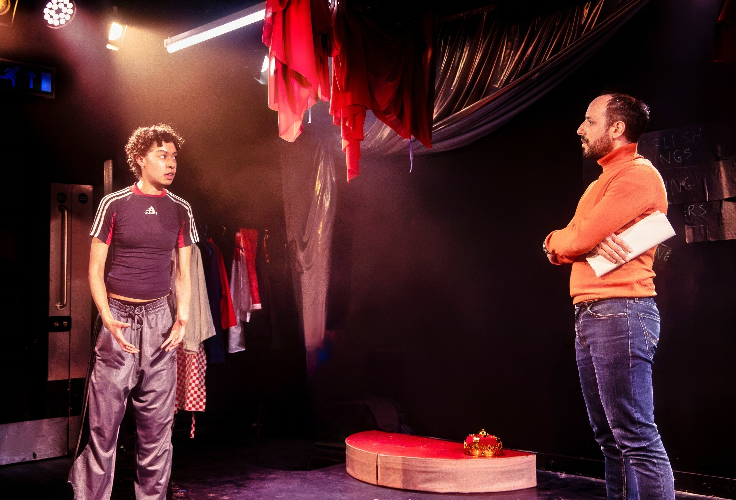“English kings kill foreigners” is a strong title. It’s also a bold play. Actors and writers Nina Bowers and Philip Arditti generously pour all their experiences and hearts into these 70 minutes of a play within a play.
After an opening featuring audience participation, we meet fictional Nina and Philip: they’re locked outside the theatre where they’re supposed to rehearse for a production of Henry V. They’re late and eager to make a good impression. To fit in. But nobody is letting them in. That’s until the star of the show drops dead in the rehearsal room. A recasting is made and Nina from “Soldier 3” ascends the throne of the titular role. Conflict ensues.
Bowers and Arditti cleverly use the backstage drama tropes and Shakespeare’s well-known text to talk about feeling British. How can a mixed-race Canadian woman authentically portray British royalty? Can a Turkish actor only play terrorists and Kebab shop owners? “To thine own self be true” is easier said than done. In a time where casting directors are priding themselves on their more inclusive choices, this play bravely questions the motives and reality of casting non-white actors in Shakespearean productions: are they invited to bring their authentic self or play a convenient stereotype for white British audiences? Are they lead actors or a fleeting diversity token of the white British establishment? Rejection is a burning feeling. Foreigners too often choose to bury their heritage to create a British-passing new self. To be admitted in the inner “RADA” circle. If that’s even possible. In the process, they likely end up in a grey area between themselves and who people expect them to be. Either adapting to or clashing with each person they meet. It’s funny yet excruciating to see this play out on stage. Beneath the mischievous guise, I felt some legitimate frustration and pain. Identities and cultures are a delicate territory to tread with care and respect. Especially when they’re different from our own. Giving in to anger and extremist attitudes to protect your nation from immigration or avenge past brutalities can be tempting. The consequence of cultural clashes can take years to deal with. You see this inner struggle in the actors’ faces as they’re called to channel their proudest British spirit to go to war for Shakespeare’s country.
I really liked the raw and fiery staging. It gave huge immediacy and urgency to the whole evening. Both actors are quick on their feet and have great chemistry. In a very simple and exposing set, they confidently play with each other and the audience with a performance that merges improvisation and scripted acting very effectively. It is in fact a style that really suits the intent: this play is a call to action. They ask the audience’s input to shape the narrative. The future is in our hands too.
In recent years there have definitely been many attempts to make “the Bard” more modern and accessible; contemporary clothes, hints at recent politics. The latest very welcome choices are indeed non-white casting and non-RP accents. One might hope they’ll go a step further and have more non-British actors authentically play French kings, Italian noblemen, Greek youngsters and so on. Maybe, despite all these efforts, Shakespeare will always be quintessentially “British”. Something or someone to aspire to.
It runs till 11th May.
Review: Francesco Pagnoncelli Photo: Lucy Hayes Photography

